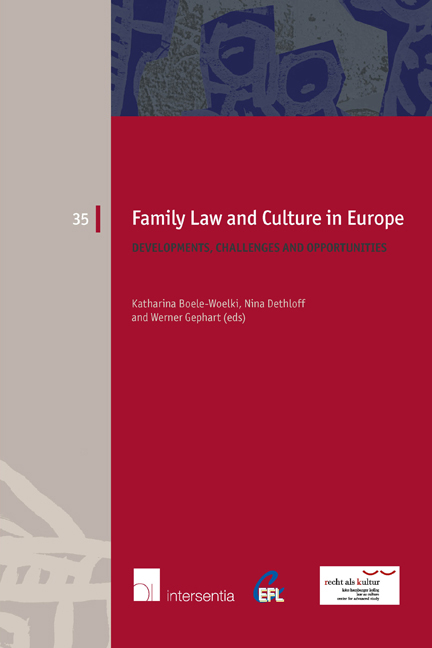Book contents
- Frontmatter
- Preface
- Contents
- List of Authors
- PART ONE THE CEFL PRINCIPLES ON PROPERTY RELATIONS BETWEEN SPOUSES
- PART TWO BREAKUP OF (NON-)FORMALISED RELATIONSHIPS
- PART THREE NEW CONCEPTS OF PARENTAGE
- The Right of the Child to Parents
- Contracting on Parentage
- Biological and Social Parenthood
- France: Biological and Social Parentage
- Anonymous Relinquishment and Baby-Boxes: Life-Saving Mechanisms or a Violation of Human Rights?
- Cross-Border Surrogacy: Time for a Convention?
- Re-Thinking Family Law: A New Legal Paradigm for Stepfamilies?
- PART FOUR INTERNATIONAL FAMILY RELATIONSHIPS
- PART FIVE TRANSNATIONAL FAMILIES: ACROSS NATIONS AND CULTURES
- EUROPEAN FAMILY LAW SERIES
The Right of the Child to Parents
from PART THREE - NEW CONCEPTS OF PARENTAGE
Published online by Cambridge University Press: 22 November 2017
- Frontmatter
- Preface
- Contents
- List of Authors
- PART ONE THE CEFL PRINCIPLES ON PROPERTY RELATIONS BETWEEN SPOUSES
- PART TWO BREAKUP OF (NON-)FORMALISED RELATIONSHIPS
- PART THREE NEW CONCEPTS OF PARENTAGE
- The Right of the Child to Parents
- Contracting on Parentage
- Biological and Social Parenthood
- France: Biological and Social Parentage
- Anonymous Relinquishment and Baby-Boxes: Life-Saving Mechanisms or a Violation of Human Rights?
- Cross-Border Surrogacy: Time for a Convention?
- Re-Thinking Family Law: A New Legal Paradigm for Stepfamilies?
- PART FOUR INTERNATIONAL FAMILY RELATIONSHIPS
- PART FIVE TRANSNATIONAL FAMILIES: ACROSS NATIONS AND CULTURES
- EUROPEAN FAMILY LAW SERIES
Summary
INTRODUCTION
What is a parent? And who is it? For ages, the law concerning the establishment of legal parenthood has been built on the postulate that a child's genetic parents are the parents of that child and, thus, the law should only confirm this. This notion that legislation is and ought to be a mere reflection of a biological fact has long characterised the legal discourse on parenthood. At the same time, however, it is obvious that parenthood, from a legal point of view, is not an unambiguous concept. Behind a uniform façade is a more complicated structure. Different ideologies and adjustments to reality have resulted in regulation that does not have one but rather several possible answers to the question of ‘who is the parent?’
In recent decades, the view of what and who a parent is has rapidly changed. Several factors have led to this development. The family as a societal phenomenon has transformed over the years. The nuclear family, based on the married heterosexual couple, is no longer the only socially or legally accepted model. There has been a dramatic increase in the number of reconstituted families, single-parent families, and rainbow families. Children can have many ‘parents’ during a lifetime, in particular during childhood. The picture of parenthood becomes even more complex through the use of different methods for assisted reproduction that are easily accessible on a global market, helping many people become genetic and biological parents when this was previously impossible. At the same time as the concept of parent has been widened to also include non-genetic parents, legal ties between family members can now be questioned and revoked on scientific grounds, as DNA analysis is used more frequently in order to clarify genetic kinship.
In the midst of these developments stands the child, whose best interests should be the primary consideration when legal matters affecting the child are at stake. A need to re-evaluate the fundamentals of the regulation concerning legal parenthood emerges if it is the child's interests that are to be protected. Nature can no longer be used as the sole normative source for rules concerning the establishment of legal parenthood in the post-modern society.
- Type
- Chapter
- Information
- Family Law and Culture in EuropeDevelopments, Challenges and Opportunities, pp. 137 - 150Publisher: IntersentiaPrint publication year: 2014

